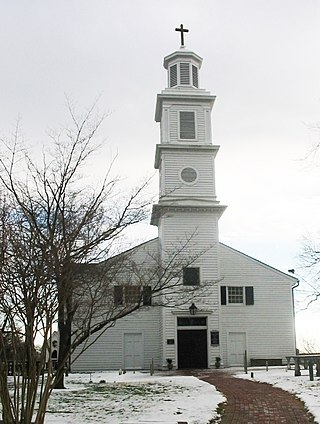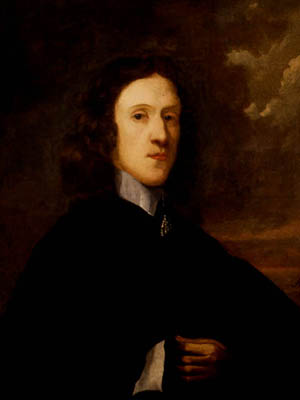
Peyton Randolph was an American politician and planter who was a Founding Father of the United States. Born into Virginia's wealthiest and most powerful family,Randolph served as speaker of Virginia's House of Burgesses,president of the first two Virginia Conventions,and president of the First Continental Congress. He also served briefly as president of the Second Continental Congress.

Patrick Henry was an American politician,planter and orator who declared to the Second Virginia Convention (1775):"Give me liberty,or give me death!" A Founding Father,he served as the first and sixth post-colonial Governor of Virginia,from 1776 to 1779 and from 1784 to 1786.

Edmund Pendleton was an American planter,politician,lawyer,and judge. He served in the Virginia legislature before and during the American Revolutionary War,becoming the first speaker of the Virginia House of Delegates. Pendleton attended the First Continental Congress as one of Virginia's delegates alongside George Washington and Patrick Henry,signed the Continental Association,and led the conventions both wherein Virginia declared independence (1776) and adopted the United States Constitution (1788).

George Wythe was an American academic,scholar and judge who was one of the Founding Fathers of the United States. The first of the seven signatories of the United States Declaration of Independence from Virginia,Wythe served as one of Virginia's representatives to the Continental Congress and the Philadelphia Convention and served on a committee that established the convention's rules and procedures. He left the convention before signing the United States Constitution to tend to his dying wife. He was elected to the Virginia Ratifying Convention and helped ensure that his home state ratified the Constitution. Wythe taught and was a mentor to Thomas Jefferson,John Marshall,Henry Clay and other men who became American leaders.

Richard Bland,sometimes referred to as Richard Bland II or Richard Bland of Jordan's Point,was an American Founding Father,planter,lawyer and politician from Virginia. A cousin and early mentor of Thomas Jefferson,Bland served 34 years in the Virginia General Assembly,and with John Robinson and this man's cousin Peyton Randolph as one of the most influential and productive burgesses during the last quarter century of the colonial period.

Founded in 1889,the Association for the Preservation of Virginia Antiquities was the United States' first statewide historic preservation group. In 2003 the organization adopted the new name APVA Preservation Virginia to reflect a broader focus on statewide Preservation and in 2009 it shortened its name to Preservation Virginia. Preservation Virginia owns historic sites across Virginia including Historic Jamestowne,located at Jamestown,Virginia,site of the first permanent English settlement in North America,and the Cape Henry Light house,one of the first public works projects of the United States of America.

Isham Randolph was an American planter,merchant,public official,and shipmaster. He was the maternal grandfather of United States President Thomas Jefferson.

St. John's Church is an Episcopal church located at 2401 East Broad Street in Richmond,Virginia,United States. Formed from several earlier parishes,St. John's is the oldest church in the city of Richmond,Virginia. It was built in 1741 by William Randolph's son,Colonel Richard Randolph;the Church Hill district was named for it. It was the site of two important conventions in the period leading to the American Revolutionary War,and is famous as the location where American Founding Father Patrick Henry gave his memorable speech at the Second Virginia Convention,closing with the often-quoted demand,"Give me liberty,or give me death!" The church is designated as a National Historic Landmark.

The Randolph family of Virginia is a prominent political family,whose members contributed to the politics of Colonial Virginia and Virginia after statehood. They are descended from the Randolphs of Morton Morrell,Warwickshire,England. The first Randolph in America was Edward Fitz Randolph,who settled in Massachusetts in 1630. His nephew,William Randolph,later came to Virginia as an orphan in 1669. He made his home at Turkey Island along the James River. Because of their numerous progeny,William Randolph and his wife,Mary Isham Randolph,have been referred to as "the Adam and Eve of Virginia". The Randolph family was the wealthiest and most powerful family in 18th-century Virginia.
Robert Beverley Jr. was a historian of early colonial Virginia,as well as a planter and politician.

Scotchtown is a plantation located in Hanover County,Virginia,that from 1771 to 1778 was owned and used as a residence by U.S. Founding Father Patrick Henry,his wife Sarah and their children. He was a revolutionary and elected in 1778 as the first Governor of Virginia. The house is located in Beaverdam,Virginia,10 miles (16 km) northwest of Ashland,Virginia on VA 685. The house,at 93 feet (28 m) by 35 feet (11 m),is one of the largest 18th-century homes to survive in the Americas. In its present configuration,it has eight substantial rooms on the first floor surrounding a central passage,with a full attic above and English basement with windows below. It was designated a National Historic Landmark in 1965.

Robert Carter Nicholas was a Virginia lawyer,patriot,legislator and judge. He served in the Virginia House of Burgesses and its successor,the Virginia House of Delegates. He became the last treasurer of the Colony of Virginia,and sat on the first High Court of Chancery,one of the predecessors of the Supreme Court of Virginia.
John Fleming was a judge in Cumberland County,Virginia who served in the Virginia House of Burgesses for more than a decade,working with John Robinson and Peyton Randolph. In 1764,he worked with Patrick Henry,George Johnston and Robert Munford on the Virginia Stamp Act Resolutions. His son William Fleming later held his seat in the House of Burgesses,representing Cumberland County.
The John Robinson estate scandal was a major financial scandal in Colonial Virginia.

John Robinson,Jr. was an American politician and landowner in the colony of Virginia. Robinson served as Speaker of the House of Burgesses from 1738 until his death,the longest tenure in the history of that office.

Colonel John Page was a planter,slave trader,merchant and politician in colonial Virginia. Born in East Bedfont,Middlesex,Page eventually migrated to the colony of Virginia,where he lived in Middle Plantation and served as a member of the House of Burgesses from 1665 to 1677 and a member of the Virginia Governor's Council from 1677 to 1692. A wealthy landowner,Page donated land and funds towards construction of the Bruton Parish Church. Page was also involved in the establishment of the College of William &Mary in 1693,as well as being a chief proponent of Middle Plantation being designated the colony's capital in 1698.
Mosby Tavern,also called Old Cumberland Courthouse or Littleberry Mosby House,is a National Register of Historic Places building in Powhatan County,Virginia. Located southeast of the intersection of U.S. Route 60 and State Route 629 in Powhatan County,Virginia,with a street address of 2625 Old Tavern Road,it began as a small one-room house built by Benjamin Mosby in 1740,and remains a private residence today.

William Randolph II,also known as William Randolph Jr. or Councillor Randolph,was an American planter and politician. He was the Treasurer of Virginia and the oldest child of William Randolph and Mary Isham.
Charles Carter was a Virginia planter,patriot,and politician. He was sometimes nicknamed "Blaze" for his red face or reckless behavior,or "Nanzatico" or "Ludlow" for plantation houses he erected but was later forced to sell. He held several local offices in King George County and later in Stafford County,both of which he represented at various times in the Virginia House of Burgesses before the American Revolutionary War. This Charles Carter also represented Stafford County in four of Virginia's Revolutionary Conventions and operated saltpeter factories and the important Chiswell lead mines during the conflict,then won election to both houses of the Virginia General Assembly,although he may only have been seated as one of Stafford County's representatives in the Virginia House of Delegates before taking a sear on the Governor's Advisory Council shortly after his election to the Virginia senate.













